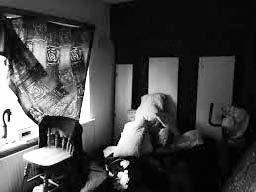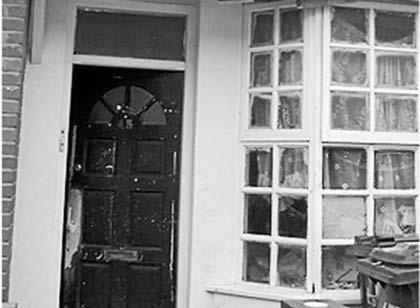


My sister was visiting from out of state, and I was off work that day. I only accompanied Mary to the hospital to pick up one foster baby, and that was Augusta. Baby Augusta was a day and a half old when we arrived at the hospital to pick her up and take her away from her mom. There were four people there: the birth mother along with her mother, some quiet guy who stayed in the background and the infant. They had been informed twenty minutes previous of the baby’s removal and were in a state of denial. The mother had brown hair, so the contrast of her pasty white skin with her dark hair was like driving over a curb, not exactly a shock to the system but it grabbed your attention. No, she wasn’t sick, but giving birth takes a lot out of you. The grandmother was about forty and was the most vocal of the four. She wouldn’t look anyone in the eye and couldn’t speak in comprehensible sentences but that didn’t stop her from talking. The man seemed to be the consort of the grandmother in some way or another, but he hovered in the shadows and feigned invisibility, social if not physical. The baby lay on mother’s chest, quiet and sleeping. I couldn’t get a good look at her at first.
“They don’t like us,” said the baby’s grandmother. We were ready to take her.”
I tried to get a look at the infant.
“We have the two older sisters,” continued grandma. “We take good care of them. Isn’t fair.”
“What isn’t fair?” I asked.
“They don’t like us.”
“Who?”
Grandma’s name turned out to be Linda. She was slender and attractive with light brown hair. Linda muttered, “It’s a different social worker.”
“Different? How?”
In a lower voice, “She doesn’t like us—says our house… She doesn’t like our house.”
I pushed ahead of her a little, nudging forward so I could see my wife, Mary, the birth mother, Ellen, and the baby a little better. The baby was still buried between Ellen’s breasts and the folds of her hospital clothes. Mary said, “We’re not going to try and take your baby from you. We don’t want to replace you. We just want to give your little girl the best care we can until everything’s settled.”
Ellen looked down at the newborn and saying nothing, handed Augusta to Mary.
“Put in a good word for us,” mumbled Linda as she left the room.
We finished packing, and as I was holding Augusta in the car seat, Mary impulsively gave birth mother a hug. Ellen finally let loose with some squeaky attempts not to cry and some quick heavy tears.
* * *
When we got home I looked at Augusta for the first time, and I gave her a temporary nickname, Pinkie. She had light blonde hair and her skin was so pink. I turned to Mary and asked, “Hey, how much can we get for a healthy white baby?” I turned to Mary and my sister, Julia, and asked, “Hey, how much can we get for a healthy white baby?”
Julia smiled. Mary wasn’t very enthusiastic about the joke—she clearly had other things on her mind. Or maybe jokes about selling babies and foster care don’t mix, damn it! I’ll work on developing social skills at some later date. It’s a slow process.
* * *
Mary took an immediate liking to Augusta’s mother Ellen. She invited her over to our house for her visits. Ellen would hold Augusta and talk to Mary.
Ellen had that rare but bleak beauty of someone trying to get her life back together. She was quiet but not shy about revealing her secrets.
Ellen had been living with her two toddlers, her boyfriend, Luis and her mother, Linda. The older child was a redhead named Jill, and the second was a brunette named Felicia.
Ellen came home from work one evening.
Her mother, Linda was sleeping with her boyfriend.
Ellen dragged Linda out of bed and gave her mother the beating of a lifetime. The boyfriend and the other family members couldn’t pry Linda’s arm out of Ellen’s grip, and the police had to be called. They came to the house and arrested Ellen.
* * *
We often picked up Ellen and took her to church. One Sunday after church was over we got back in the car, and Mary and Ellen started talking; while I was in the backseat glancing over at the baby sleeping in her rear-facing car seat.
“We should let your mom see Augusta,” suggested Mary abruptly.
Ellen warned, “I have to be careful around my mom. If she doesn’t like what I do or say she uses it as an excuse to keep me from seeing my other daughters.”
We knocked on the door, and Ellen’s sister, a mentally challenged young lady, let us inside. No, it was not a home in unbelievable squalor, but there were some serious cracks in the wall near the fireplace. I saw an old woman slowly (Oh—so slowly) making her way through the house with the aid of a walker and an oxygen tank. She, I later learned, was the great grandmother who paid most of the bills around this place. A second sister peeked in on us and went back in her room. We were ushered quickly through the house, and soon Linda was holding Augusta, and I met the older siblings, Jill and Felicia. Great, I thought as I reflected on Ellen’s kids—a redhead, a brunette and a blonde—one of each. Ellen and Linda gaped and gawked at the baby. Mary was keeping a close eye on the adults. The two older siblings cornered me.
Neither the five nor the three year old spoke a language that approximated English. They screamed and pointed to great effect and seemed immensely grateful for the human contact. They both still had a wonderful childlike gleam in their eyes that hadn’t been quenched.
* * *
“Those kids are on their own,” I told Mary later that day after we dropped Ellen off.
“Something’s wrong at that house,” she agreed. “Who was that guy?”
There were so many people moving around the house I kind of lost track. There was Linda, the ancient, oxygen tank grandma, the mentally challenged sister, a second sister who mostly stayed in her room and one middle-aged man. Then, there were the children. My critical, suspicious eye was set to soft focus on that trip.
“What about the guy?” I asked.
“He mostly stayed in the background and never spoke,” said Mary.
Funny how someone can be present and yet nearly invisible—must have been the man who was hiding in the shadows at the hospital. I didn’t think about him. Mary sure as hell did.
I was becoming more like Mary—more idealistic. She was transforming into more of a realist like me. She stood up and began pacing, forcing her mind into unwanted, unfamiliar corners, into the land of suspicion, of watchfulness.
“Why would Linda claim that there were four adults living there…” Mary stated in her staccato, paper ripping voice. “…when there are five?” There was a strange glint in her eyes. They flickered with some kind of secret fire.
“I don’t understand what you’re getting at.”
“Linda’s hiding something,” she said, her voice getting this quiet, dangerous tone. “That guy who was there…”
I said, “That must be Linda’s husband. Ellen says they haven’t ‘constipated’ it yet. Her word, not mine.”
“She’s covering something up.”
* * *
Mary called Child Protective Services. Tamara Le Breun, the social worker, found out that Linda was married to an accused child molester.
The two little girls, the redhead and the brunette, were taken out of the grandmother’s house and placed in a foster home—the home of an experienced older couple who already had nurtured a number of foster kids. They quickly reported that one of the girls was acting out, pantomiming sexual movements.

 Owner/Editor - Chris Chmielewski
Owner/Editor - Chris Chmielewski